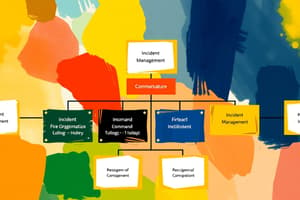Podcast
Questions and Answers
What is the primary responsibility of the Incident Commander (IC)?
What is the primary responsibility of the Incident Commander (IC)?
- To coordinate with other agencies
- To manage all incident operations (correct)
- To interface with the public and media
- To perform tactical operations at the scene
Which role is NOT part of the Command Staff?
Which role is NOT part of the Command Staff?
- Operations Section Chief (correct)
- Safety Officer
- Public Information Officer
- Liaison Officer
Which of the following is a responsibility of the Safety Officer?
Which of the following is a responsibility of the Safety Officer?
- Ordering resources for operations
- Developing measures for personnel safety (correct)
- Managing public relations
- Assessing financial implications of the incident
What is the role of the Liaison Officer?
What is the role of the Liaison Officer?
At what organizational level does the Operations Section fall within incident management?
At what organizational level does the Operations Section fall within incident management?
How are Branches in the Operations Section identified?
How are Branches in the Operations Section identified?
Which organizational level is responsible for operations within a defined geographic area?
Which organizational level is responsible for operations within a defined geographic area?
What defines a Group within the incident management structure?
What defines a Group within the incident management structure?
Which component is responsible for the collection and documentation of incident information?
Which component is responsible for the collection and documentation of incident information?
What is a Task Force in the context of incident management?
What is a Task Force in the context of incident management?
Which section is responsible for providing facilities and services during an incident?
Which section is responsible for providing facilities and services during an incident?
Which unit primarily handles the financial aspects of an incident?
Which unit primarily handles the financial aspects of an incident?
What defines a Strike Team or Resource Team?
What defines a Strike Team or Resource Team?
What is the main focus of the Intelligence/Investigations Function in incident management?
What is the main focus of the Intelligence/Investigations Function in incident management?
Which unit is part of the Planning Section responsible for documentation?
Which unit is part of the Planning Section responsible for documentation?
Which of the following best describes a Single Resource in incident management?
Which of the following best describes a Single Resource in incident management?
Flashcards are hidden until you start studying
Study Notes
Standard Terminology Associated with Organizational Elements
- Incident Commander (IC): Oversees all incident activities, strategy development, resource management, and has final authority on incident operations.
- Command Staff Roles:
- Liaison Officer: Coordinates with cooperating agencies, may have assistants.
- Public Information Officer: Manages communication with the public and media regarding incident-related information.
- Safety Officer: Identifies safety hazards, ensures personnel safety, and may have assistants.
- General Staff: Responsible for primary incident management areas including Operations, Planning, Logistics, and Finance/Administration.
- Operations Section Duties: Directs all tactical operations, subdivided into Branches, Divisions, and Groups.
- Branch: Organizes major parts of operations, labeled by Roman numerals or functional/jurisdictional names.
- Division: Manages operations within a specified geographic area.
- Group: Focuses on functional areas of operations, situated between Branches and Resources.
Basic Incident Command System for Initial Response, ICS 200
- Operations Section Components:
- Unit: Handles specific planning, logistics, or finance tasks for the incident.
- Task Force: Formed group of resources with shared communication and a designated leader.
- Strike Team/Resource Team: Specific combinations of identical resources under a leader.
- Single Resource: Individual personnel or equipment that can operate on the incident.
Additional Sections
- Planning Section: Collects, assesses, and disseminates incident information; prepares the Incident Action Plan; includes Situation, Resources, Documentation, Demobilization Units, and Technical Specialists.
- Logistics Section: Supplies necessary facilities, services, and materials; comprises the Service Branch (Communications, Medical, Food Units) and the Support Branch (Supply, Facilities, Ground Support Units).
- Finance/Administration Section: Manages incident costs and financial aspects; includes Time, Procurement, Compensation/Claims, and Cost Units.
Intelligence/Investigations Function
- Addresses incidents requiring thorough intelligence gathering and investigations, enabling the Incident Commander or Unified Command to adjust responsibilities as needed for effective management.
Studying That Suits You
Use AI to generate personalized quizzes and flashcards to suit your learning preferences.



